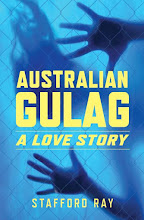We have all experienced the warmth and support friendships bring when we have a setback.
A friend once wrote me a cheque for $50,000 when I needed it most. I did not ask. He just handed me the cheque and said; “Will this help?” That kindness saved me from losing my farm, and he was paid back with interest within a year.
But it is not that sort of help we need when we have suffered the loss of a loved one, particularly if his/her death is sudden and even more so if he/she was murdered.

We get calls of condolence immediately, and many friends come to the funeral so we feel supported then. We have a service of some kind where we express our grief in the presence of friends and family then we all go home, the less connected put it behind them and get on with their lives.
But in these extreme cases, where there are questions left over, some of criminal culpability but more important to us are the questions that arise as we revisit any action of our own that might have contributed, no matter how minor, to the situation that allowed the tragedy to happen.
That is the time we need our friends to come around, prod us into talking and to listen. Questions may need to be asked; “What is worrying you most? Do you think you should have done more/done it differently/done it sooner?” The answer in most cases should be ‘yes’ but is sometimes is denied for now, but if it is yes, the next question must be; “OK so what do you think you could have done?” That should get it started, but what then?
There is no value in saying things like; ‘You are not to blame, it would have happened anyway, he/she brought it on him/herself, it was the lifestyle he/she chose etc’. All those ready excuses will only make the guilt worse. We would like to grab onto them, but we can’t.
Friends and relatives suffer the pain of hindsight; opportunities that were not recognised at the time, words said that can never be withdrawn, appeals ignored through anger or resentment. All the real or imagined shortcomings are paraded past, newly clarified and accusing.
What is needed is an opportunity to confess all those guilty thoughts to a significant adult, someone who has the power to judge but loves us enough to understand, so the anguish and remorse can be expressed fully, with the freedom to cry, wail and blubber as many times as necessary to get it all out. But that takes time.
A good friend will call around every day if necessary, call on the phone if unable to provide a physical presence, and remind others of what is needed and even organise the team. Funerals are over in a day but grieving takes a little longer.
Image by courtesy http://www.stockfreeimages.com/p1/empty-chair.html
 We get calls of condolence immediately, and many friends come to the funeral so we feel supported then. We have a service of some kind where we express our grief in the presence of friends and family then we all go home, the less connected put it behind them and get on with their lives.
We get calls of condolence immediately, and many friends come to the funeral so we feel supported then. We have a service of some kind where we express our grief in the presence of friends and family then we all go home, the less connected put it behind them and get on with their lives.
